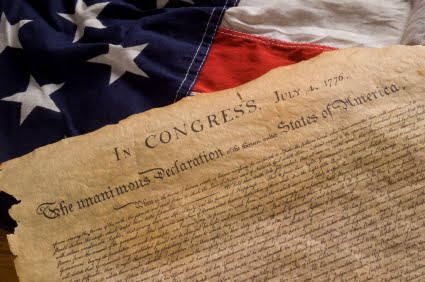VOLUME 1 ISSUE 24
“ONE NATION UNDER GOD'
Courts possess very potent powers, both coercive and moral.
Although that power is asserted over an entire culture it is not
dramatic because it proceeds incrementally, but since the
increments accumulate, it is all the more potent for that. What
Judges have wrought is a coup d'etat-slow-moving and genteel,
but a coup d'etat nonetheless. Robert Bork
Courts possess very potent powers, both coercive and moral.
Although that power is asserted over an entire culture it is not
dramatic because it proceeds incrementally, but since the
increments accumulate, it is all the more potent for that. What
Judges have wrought is a coup d'etat-slow-moving and genteel,
but a coup d'etat nonetheless. Robert Bork
Each day, after a moment of silence, over 47,000 children enrolled in the Winston-Salem/Forsyth County School system begin the day by standing with their hand over their heart, facing the flag of the United States of America
In the context of the Pledge, the statement that the United States United States
Newdow vs. Elk Grove Unified School District *will soon be decided by the United States Supreme Court. It is a curious case.
The Pledge of Allegiance was the authored by Francis Bellamy, who was both a socialist and a Baptist minister. In 1892, while serving as Chairman of a committee of State School Superintendents, he introduced the Pledge to celebrate of the 400th anniversary of the discovery of the New World by Christopher Columbus. The word “equality” was omitted from his original draft in deference to a widely held belief by some that equality toward African Americans and women was not required. In 1954, after a campaign by the Knights of Columbus, Congress added the words “under God”.
Michael Newdow, an atheist, is the estranged father of an eight year old student in the Elk Grove California
The First Amendment of the Constitution was adopted in 1789 and reads as follows: “Congress shall make no law respecting an establishment of religion, or prohibiting the free exercise thereof.” Several states, including North Carolina
The Amendment prohibits Congress from making any law inhibiting the free exercise of religion. Further it mandates that the Federal Government refrain from favoring one religion over another or from discriminating against any citizen on account of religious belief.
Religion has always been intertwined with American government. No serious study of the history of our Republic could conclude otherwise. Reverent appreciation of the blessings of God toward our country has been a part of our Government since its inception. America
Over the years in one case after another, the Supreme Court has steadily moved our nation from its religious roots toward a secular indifference to religion. Historian Thomas West points to the obvious consequence of this movement: “Government's ban on God is particularly striking in light of this fact: the Declaration of Independence says liberty is our inalienable right only because we are "endowed" with that right by our Creator. Our principles supposedly require us never to breathe a word to school children about where those principles come from. But if we refuse to acknowledge that foundation of our principles in "the laws of nature and of nature's God," what do our principles rest on? If liberty is not the gift of God, it must be the gift of government. But what government gives, government may take away. As Jefferson said: without God, liberty will not last.”
The sovereignty of God is not affected by the removal of religion from the classrooms of this country. It is the sovereignty of the people who are challenged by the omission. Only someone unfamiliar with religion could ever conclude that the historically descriptive phrase “one nation under God” is a prayer. Yet, if it is a prayer, let us hope that it is a prayer answered. If it is religious coercion, let every citizen be so compelled. God speaks to the heart of mankind in a voice too loud to be muffled by the dictates of the Supreme Court of this land. Liberty
As the Supreme Court considers this case,* will you pray with me a graduation prayer ruled unconstitutional in 1992:
God of the Free, Hope of the Brave –
For the liberty of America
May our children grow up to guard it.
May each of us strive to fulfill what you require of us: To do justly,
to love mercy,
to walk humbly with the Lord, Our God.

